The inside story of how England won the Under-17 World Cup
Two years ago, one of England’s most talented generations in years were crowned world champions. This, in their own words, is how they did it
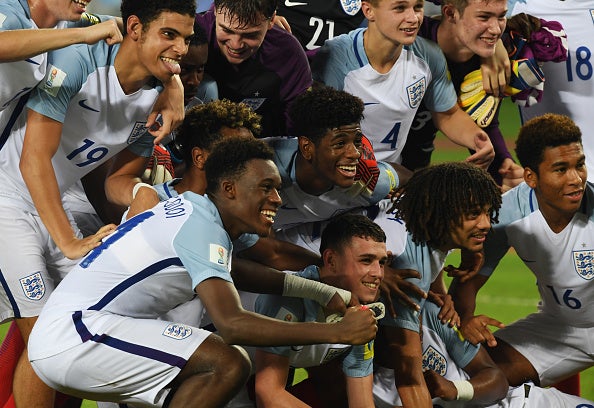
Your support helps us to tell the story
From reproductive rights to climate change to Big Tech, The Independent is on the ground when the story is developing. Whether it's investigating the financials of Elon Musk's pro-Trump PAC or producing our latest documentary, 'The A Word', which shines a light on the American women fighting for reproductive rights, we know how important it is to parse out the facts from the messaging.
At such a critical moment in US history, we need reporters on the ground. Your donation allows us to keep sending journalists to speak to both sides of the story.
The Independent is trusted by Americans across the entire political spectrum. And unlike many other quality news outlets, we choose not to lock Americans out of our reporting and analysis with paywalls. We believe quality journalism should be available to everyone, paid for by those who can afford it.
Your support makes all the difference.Last night, as Brazil defeated Mexico in the final, England’s reign as Under-17 world champions finally came to an end. This is the story of how Steve Cooper’s side went to India to announce themselves as England’s next generation.
When the half-time whistle blew and the vuvuzelas howled into the night, it sounded like nothing they’d ever heard. As they walked down the tunnel, Spain’s squad whooped and hollered, smiled and slapped one another on the back. Six months after defeating England on penalties at the European Championships, this was how it felt to be winning a World Cup final. But as the noise rushed down into the dressing rooms, England’s players had rarely been so still.
During the month that preceded the final, Steve Cooper’s squad had always taken five minutes at the interval to “ruthlessly” air their grievances, pick glaringly at each other’s mistakes and demand more until the manager stepped in. But on this occasion, caught in a chaos of nostalgia, they were all serene. “There was nothing negative to say, they scored two freak goals, and even though we were losing we knew we’d already won,” said Manchester United midfielder Angel Gomes. “When we come back in here we’d better be champions. That’s all that was said.”
The team’s captain Joel Latibeaudiere and Chelsea defender Marc Guehi led a rousing motivational speech. “Not again, not again,” they repeated. Soon the other players joined in, shouting wild encouragement. Aside from a few tactical whispers to individuals, Cooper realised there was no need to take control. The fans at pitchside hadn’t heard it yet, but England had already conjured a riot of their own. “They [Spain’s players] were all hugging each other, thinking they’d already won,” doubled Latibeaudiere. “We weren’t going to let that happen again.”
The onslaught that followed defined a new generation of English footballers, transforming intangible talent into a hardened reality. Morgan Gibbs-White scored the equaliser just 10 minutes into the second half, then Phil Foden hit twice before Guehi nailed the coffin shut in the final minutes. “We knew we had to prove that we couldn’t just win the World Cup but beat them [Spain],” says Crystal Palace’s Nya Kirby. “That made it even better. It doubled the glory.”
***
When they stepped off the plane, the sun was brutal. England’s squad had purposefully arrived a fortnight early to acclimatise, but the minute they felt Mumbai’s cloying heat and were ushered towards a police escort, they realised the trip was unlike any they’d taken as a group before. “It was so humid,” Latibeaudiere says. “Just trying to breathe, constantly sweating.”
For those two weeks, they were without the team chef and some players immediately fell queasy after eating local food. Others put in requests to change rooms to escape the swarm of insects. On the main road outside the hotel, cows wandered up and down, serving as a continual reminder of how far the players were from home. A boyishness returned, many were tense, some exhausted and several homesick. Teenage football is typically a very insular existence, living from game-to-game, tucked behind Football Association safeguards, rushed in and out. Yet in Mumbai, they’d been rocked by a chorus of exposures. “It was an eye-opener for all of us,” Latibeaudiere admitted.
“It was easily the longest time I’ve been away from home,” said Tottenham’s Tashan Oakley-Boothe. “It was a big learning experience and it builds you as a person as well. We were always trying to do something because when you’re just in your room and you’re away from home, it’s hard.” Even Callum Hudson-Odoi, a figure of contagious joy within the group, admitted “being away from home was difficult” and “a big step up”.
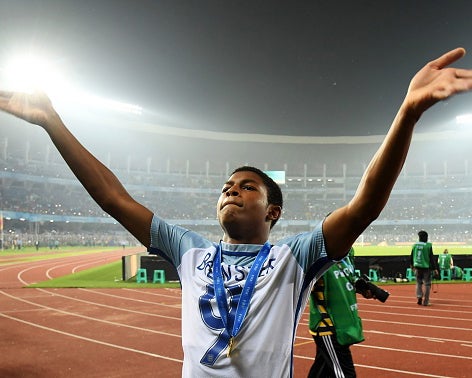
Eventually, as the tournament grew closer, excitement and anticipation sewed them together. Since they were 15 years old, the squad had remained largely unchanged – many had known each other since they were as young as seven – and their bond was unique. Hudson-Odoi, Jonathan Panzo, Jadon Sancho and Danny Loader were circus masters, constantly joking and entertaining. Rhian Brewster was an irrepressibly cheeky wind-up merchant. Timothy Eyoma – ‘TJ’ – could send the squad into fits of hysterics without even needing to say anything. Foden was baited for being inseparable from a football, always trying to nutmeg people with stray bottles on trips out of the hotel, while Gomes – the smallest in the group at 5’3” – would duck down and imitate a dog’s bark by players’ ankles as they were walking causing the whole group to erupt with laughter.
“I feel like our team has a bond like no other,” said Loader, who became the youngest Reading player to reach 20 appearances in history after the tournament. “We had a couple of songs that are always on repeat on the speaker, on the way to training, in the hotel rooms and corridors, in the changing room. Everyone is friends with everyone and we’ve grown up developing and creating memories together.”
“A lot of the players have become very close to me,” added Gomes. “Some I ring nearly every other day. That’s how much everyone glued and bonded together. It’s rare to have a team like that. It was a special relationship.”
England's route to glory
Group stage
Chile 0-4 England (Hudson-Odoi, Sancho x2, Gomes)
England 3-2 Mexico (Brewster, Foden, Sancho)
England 4-0 Iraq (Gomes, Smith Rowe, Loader x2)
Knockout stage
England 0-0 Japan (win on pen.)
USA 1-4 England (Brewster x3, Gibbs-White)
Brazil 1-3 England (Brewster x3)
England 5-2 Spain (Brewster, Gibbs-White, Foden x2, Guehi)
The top floor of the hotel was transformed into a teenage creche where every corridor and door was decorated by a basketball hoop. The ‘chill-out’ room was fitted with a PlayStation, dartboards, games and cards. In spare afternoons, the whole squad would gather for “massively competitive” Fifa tournaments – usually won by Brewster or Sancho. The other contest involved the spread of sweets each player had snuck on the plane and displayed on tables and shelves like trophies.’ “Everyone had them, but nobody brought them like Callum,” one player laughs. “He had absolutely everything. Chocolates, sweets, pastries, cakes. Callum always had the most.”
Their tightly woven bond encompassed everything, including tactical sessions with Cooper, his assistant Mike Marsh, and the rest of the coaching staff. Meetings would often be player-led, with members of the squad stating what they wanted from each of their teammates directly to the group: “What do we want from Rhian? Movement. What do we want from Panzo? To be solid and step forwards.” Collectively, their ambition was underpinned by always holding each other responsible. Nights were spent watching tapes on opposition teams individually before formulating their own game plans and consulting with Cooper.
To people outside the group, their belief could appear prematurely elevated. But it was that confidence which allowed them to set high ceilings, and rather than rein that in, Cooper gave them the freedom to weaponise it.
“The whole experience was crazy but we had such confidence as a team,” Gomes says. “We went there knowing we were going to win. Everyone will tell you the same thing. We were so used to winning because there was so much talent in the team. We’d be 20 minutes into a game and not have scored and start looking at each other like what’s going on because we were so used to dominating.”
***
Tired and jet-lagged, Jadon Sancho spun and flicked his way effortlessly through Chile’s defence. The circus over his £8m transfer from Manchester City to Borussia Dortmund had played out publicly over the summer, becoming a watershed moment of rebellion for the group. He was their best and most influential player, and he wasn’t willing to wait any longer. The problem was that, in his hurry, he’d inadvertently cut himself adrift. Dortmund were reluctant, and under no obligation, to allow him to leave during the Bundesliga season and, eventually, the FA were relieved just to persuade the club to release Sancho just for the group stages. In the opening four-goal rout, he scored twice and set up another. On the biggest stage of their lives, and the first act was well and truly up and running. “We didn’t just want to win,” Gomes says. “If we could score four, we wanted to score four, take every chance we got and never let off.”
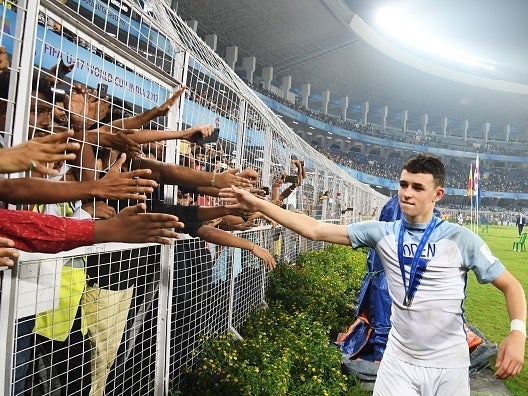
Blessed with a plethora of playmakers – including Sancho, Hudson-Odoi, Foden, Gomes, Emile Smith Rowe and Gibbs-White – much of the pressure fell on the shoulders of Brewster, as the outstanding striker in the group, to convert every chance they created. And in their second game, he alleviated that burden with a spectacular 25-yard free-kick as England raced into a 3-0 lead over Mexico. But then, something unexpected happened. In unison, England’s killer instinct deserted them. Chances slipped by, the defence suddenly showed cracks and they conceded twice, leaving them to grit out a tense finale.
Victory secured their place in the knockout rounds, but the result had become an invaluable “reality check”. “We felt invincible up until then, so strong, so good,” Latibeaudiere says. “But it showed us we are all human and we can get beat or surprised. It benefited us massively because then we knew we weren’t going to coast through to the final.”
***
Even today, Kirby can still feel the tremors of adrenaline that sizzled down his legs. Ever since he joined Tottenham’s academy as an eight-year-old, he’d always volunteered to take the fifth penalty; a roulette of pressure and glory he’d always craved.
Against Japan in the first knockout round, England had become unstuck. Sancho had reluctantly flown home, leaving his teammates with an impassioned speech urging them to “make sure they go on and win it”. But, at first, Foden, Hudson-Odoi and Brewster struggled to fill that void. Their free-flowing attacks were suddenly rushed or disjointed and after both sides spurned chances in a frenetic finish, the tie went to penalties. When Curtis Andersen made the vital save and Kirby walked to the spot, a lifetime of preparation had come to its climax.
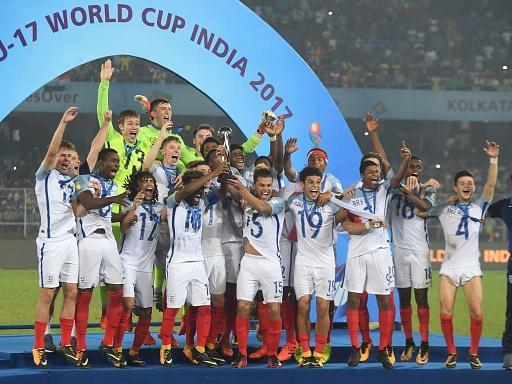
“It felt like destiny,” Kirby said. “I remember the manager doing the penalty list and mine being last. The build-up to that was immense and the crowd as well, I think it was in front of 50,000 people, the most I’ve ever played in front of. It was the most pressure I’ve felt in my career. It hit the post, my heart was in my throat, but thankfully it went in. You get lost in the moment, it was an amazing feeling. The feeling of scoring for your country is so different from scoring for your club, especially at that moment. I still get goosebumps now.”
The World Cup had been the width of a post away from escaping England. Afterwards, though, there’d be no more hiccups. Against USA and Brazil, the destructive fluidity returned to their attacks as Foden produced two breathtaking performances, setting up successive hat-tricks for Brewster – the pair finishing the tournament as best player and top goalscorer respectively. England surged into the final riding a crest of momentum that would prove impossible to stem. One where the promise of redemption and rewriting history had become as alluring as the prospect of being crowned champion itself. “Losing to Spain at the Euros had hurt us,” said Oakley Boothe. “The fact we got to the final against them, we couldn’t lose. We couldn’t not go all the way.”
***
Forty-five minutes later, the final whistle blew. This time, the noise was even greater. England’s players jumped up and down uncontrollably, matching the crowd's every scream. For what felt like an age, they ran around the stadium in tears of ecstasy. Many of their families and friends had flown out for the final and searched for them in the stands. Others scrambled for their phones and called home. “I spoke to my mum and dad straight away,” said Hudson-Odoi. “I called them and they were just screaming, I was screaming, I couldn’t believe it.”
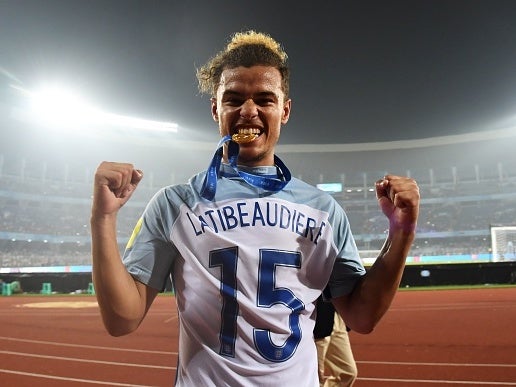
When they finally returned to the dressing room, Cooper gave a speech describing how proud he was, followed by a travelling contingent from the FA. For them, too, the legacy of the victory was priceless. “It was quite surreal to think about how far we had come as a team," Loader said. "It’s something I’ll think about not just for the rest of my career, but the rest of my life, something that I felt I had worked towards for my whole footballing career to date."
“To win a trophy that big, playing in front of 60,000 people, with such an amazing team boosted all our confidence,” Hudson-Odoi continued. “Every time I went out onto the pitch and looked around I thought it was a dream. I never expected it to be such an amazing atmosphere and I enjoyed every moment of it.”
Then he put the music on.
They danced in the changing room, they danced to the bus where their parents were waiting, they danced in a private room in the hotel, still wearing their match shirts and medals, passing the trophy back and forth long into the night.
Two years on, the sense of pride and achievement hasn’t faded. Some players in the squad have since broken into a new stratosphere, playing in the Premier League and even England’s senior side. The majority are stuck on the threshold, still awaiting their opportunity. One is not even currently a contracted professional footballer. They were the altering twists of reality that awaited when they arrived home. But even if in footballing terms they are now spread between separate universes, they are still united by what they achieved in India. And those memories are still as fresh as the day the plane hit the runway.
“It feels like it was literally the other day,” Kirby said. “Those moments, they never go to the back of your mind. It’s always there.”
Join our commenting forum
Join thought-provoking conversations, follow other Independent readers and see their replies
Comments